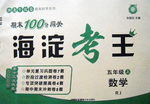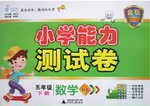题目内容
阅读理解
Madame de Stael says that only the people who can play with children are able to educate them.For
success in training children, the first condition is to become a child oneself.It means to treat the child as
really one's equal, that is, to show him the same consideration, the same kind of confidence one shows to
an adult.It means not to affect the child to be what we ourselves want him to become, but to be affected
by the impression of what the child himself is: not to treat the child with cheating, or by force, but with the
seriousness and true love suitable to his own character.
Not leaving the child in peace is the greatest problem of present methods of training children.Parents
do not see that during the whole life, the need of peace is never greater than in the years of childhood, an
inner peace under all outside liveliness.
But what does a child experience?Corrections, orders, interference (干涉), the whole livelong day.
The child is always required to leave something alone, or to do something different, to find something
different, or to want something different from what he does, or finds, or wants.He is always guided in
another direction from the true inner will that is leading him.All of this is caused by our socalled enthusiasm
in directing, advising, and helping the child to become the same model produced in one assembly lin e (流水线). Understanding, the deepest characteristic of love, is almost always absent.
e (流水线). Understanding, the deepest characteristic of love, is almost always absent.
To bring up a child means carrying one's soul in one's hand: it means never placing ourselves in danger
of meeting the cold look on the face of the child.It means the truth that the ways of injuring the child are
limitless while the ways of being useful to him are few.How seldom does the educator remember that the
child, even at four or five years of age, has already had a sharp feeling!The smallest mistrust a nd
nd
unkindness, the least act of injustice, leave wounds that last for life in the heart of the child.While, on the
other hand, unexpected friendliness and kindness make quite as deep an impression on those soft senses.
1. The passage mainly talks about________.
A. misleading zones and right ways ineducating children
B. current problems in training children
C. what should be taught to children
D. the importance of educating children
2. Children, according to the passage, are experiencing________.
A. corrections, orders and peace
B. orders, interference and peace
C. interference, orders and corrections
D. peace, guide and praise
3. If you were a parent, which of the following methods is TRUE according to the text?
A. You could treat your children not so seriously for they don't understand many things.
B. You could train your children as you wish them to be.
C. You should sometimes leave your children in peace as they wish in their childhood.
D. You should correct your children immediately if their behavior is not what you want.
4. We may conclude that the author believes people should________.
A. play with the children with enthusiasm all day long just to please them
B. try to give an order, advice and suggestions to their children at any time
C. treat their children just as the way they treat an adult in their daily life
D. regard their children as an equal to them and have understanding of the inner peace of them
success in training children, the first condition is to become a child oneself.It means to treat the child as
really one's equal, that is, to show him the same consideration, the same kind of confidence one shows to
an adult.It means not to affect the child to be what we ourselves want him to become, but to be affected
by the impression of what the child himself is: not to treat the child with cheating, or by force, but with the
seriousness and true love suitable to his own character.
Not leaving the child in peace is the greatest problem of present methods of training children.Parents
do not see that during the whole life, the need of peace is never greater than in the years of childhood, an
inner peace under all outside liveliness.
But what does a child experience?Corrections, orders, interference (干涉), the whole livelong day.
The child is always required to leave something alone, or to do something different, to find something
different, or to want something different from what he does, or finds, or wants.He is always guided in
another direction from the true inner will that is leading him.All of this is caused by our socalled enthusiasm
in directing, advising, and helping the child to become the same model produced in one assembly lin
 e (流水线). Understanding, the deepest characteristic of love, is almost always absent.
e (流水线). Understanding, the deepest characteristic of love, is almost always absent.To bring up a child means carrying one's soul in one's hand: it means never placing ourselves in danger
of meeting the cold look on the face of the child.It means the truth that the ways of injuring the child are
limitless while the ways of being useful to him are few.How seldom does the educator remember that the
child, even at four or five years of age, has already had a sharp feeling!The smallest mistrust a
 nd
ndunkindness, the least act of injustice, leave wounds that last for life in the heart of the child.While, on the
other hand, unexpected friendliness and kindness make quite as deep an impression on those soft senses.
1. The passage mainly talks about________.
A. misleading zones and right ways ineducating children
B. current problems in training children
C. what should be taught to children
D. the importance of educating children
2. Children, according to the passage, are experiencing________.
A. corrections, orders and peace
B. orders, interference and peace
C. interference, orders and corrections
D. peace, guide and praise
3. If you were a parent, which of the following methods is TRUE according to the text?
A. You could treat your children not so seriously for they don't understand many things.
B. You could train your children as you wish them to be.
C. You should sometimes leave your children in peace as they wish in their childhood.
D. You should correct your children immediately if their behavior is not what you want.
4. We may conclude that the author believes people should________.
A. play with the children with enthusiasm all day long just to please them
B. try to give an order, advice and suggestions to their children at any time
C. treat their children just as the way they treat an adult in their daily life
D. regard their children as an equal to them and have understanding of the inner peace of them
1-4: ACCD

练习册系列答案
 期末100分闯关海淀考王系列答案
期末100分闯关海淀考王系列答案 小学能力测试卷系列答案
小学能力测试卷系列答案
相关题目